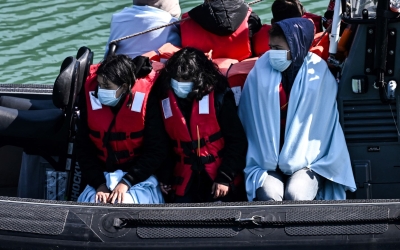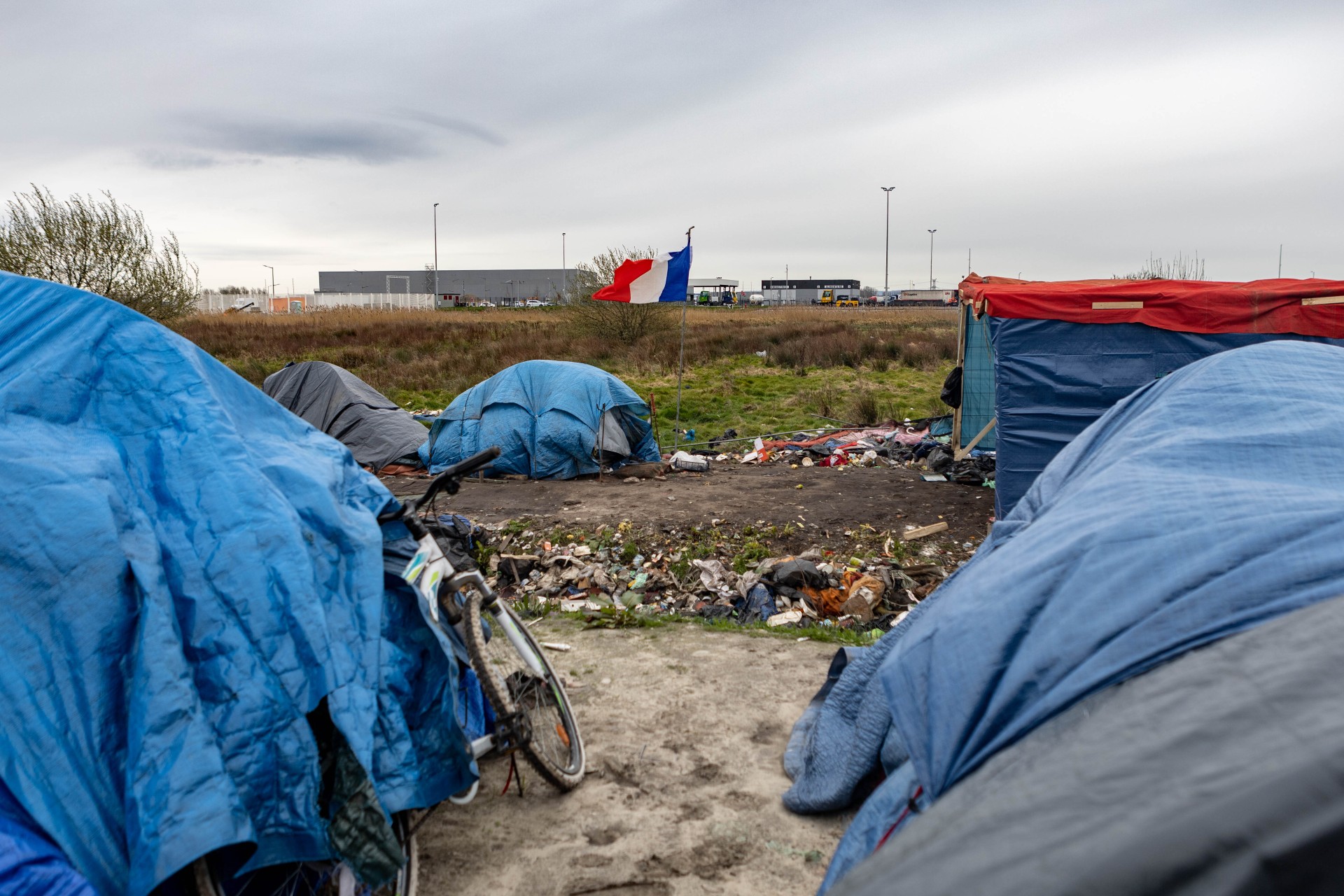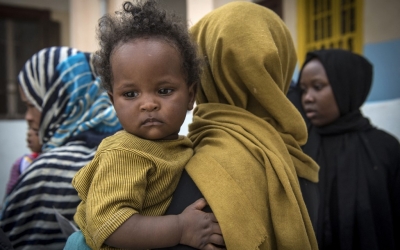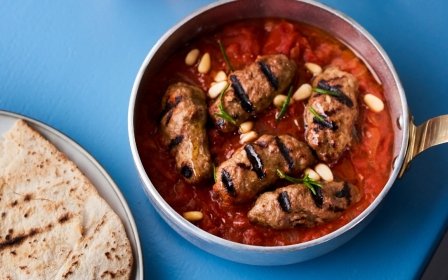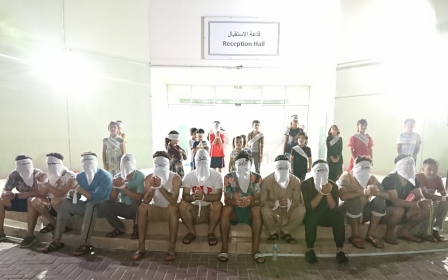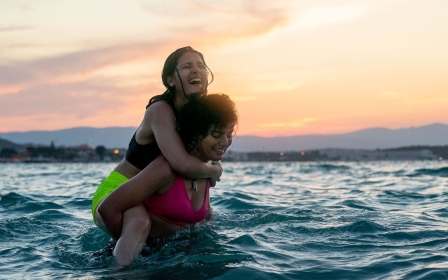Makeshift mosques and camp iftars: Ramadan as a refugee in Calais
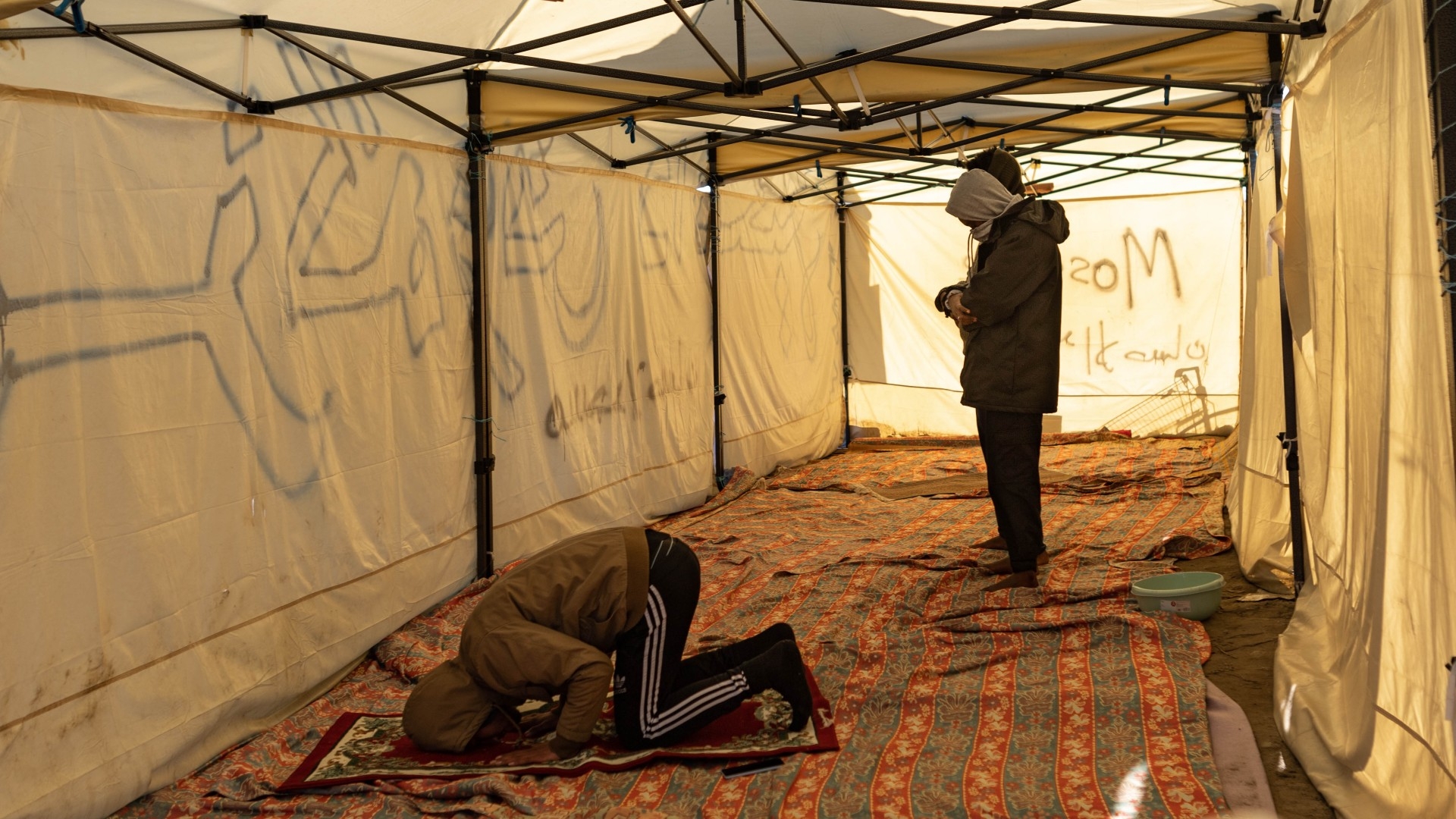
The adhan, the Muslim call to prayer, sounds from dozens of mobile phones in scattered hidden tents along the forest.
For minutes, life stops in the migrant camps of Grande Synthe nearl the French coastal town of Dunkirk, overlooking the Strait of Dover.
Men in thick coats leave their chores to pray at the so-called ‘Mosque of Dunkirk’.
The makeshift place of worship is an ochre-coloured tent held up by fragile pillars, with ground sheets to cover the rough sand floor.
At the entrance, a big jug of clean drinking water donated by humanitarian organisations is used for ablution.
New MEE newsletter: Jerusalem Dispatch
Sign up to get the latest insights and analysis on Israel-Palestine, alongside Turkey Unpacked and other MEE newsletters
During the winter months, encampments in Calais and Dunkirk are home to nearly a thousand migrants and asylum seekers from across the world aiming to reach the UK - including many Muslims observing Ramadan.
Dire life conditions and the constant threat of eviction are intensified for camp residents refraining from food and drink for long hours during the holy month.
"No one wants to spend Ramadan far from home. But I don't think we could have ever imagined that we would have to do it in a place like this," Jan, from Afghanistan, tells Middle East Eye.
'No one wants to spend Ramadan far from home. But I don't think we could have ever imagined that we would have to do it in a place like this'
- Jan, Afghan refugee
Having fled the Afghan capital Kabul, Jan now spends Ramadan quietly and meditatively in the forest near Grand-Synthe. He says that the cold weather in Europe makes it easier to save energy while fasting.
Jan proudly shows off his makeshift kitchen: pallets and pieces of wood as seats and a table, and a worn pot on old embers used for heat during the day and as an oven to prepare the iftar fast-breaking meal at sunset.
After iftar, when the last flames are extinguished, the camp is transformed into a group of near-silent, stealthy walkers.
Carrying all their belongings on their backs, migrants head for the coast line on calm sea days to board precarious plastic boats aiming to cross the world's busiest commercial waterway.
Channel crossings during Ramadan
At its narrowest part, the English Channel is just 33 kilometres long. The white cliffs of the British town of Dover can be seen on cloudless days from northern French beaches.
The natural border has witnessed a sharp increase in arrivals during the last two years: there were 45,700 crossings to the UK in 2022, far exceeding 28,400 in 2021, which already tripled the figure of the previous year.
The rise is in part due to the closure of legal routes to enter Britain to apply for asylum. It's also attributed to progressive securitisation of the French border after the Covid-19 pandemic, and the tightening of checks and controls on trucks crossing the Eurotunnel.
Increased surveillance at the border “is pushing small boat departures further away along the coast, increasing the risk of shipwreck,” warns Francesca Morassut, coordinator at Utopia 56, a France-based NGO which aids refugees and displaced people.
Last month, France and the UK signed a new deal to crack down on Channel crossings, with the British government committing €541m ($577m) to bolster French security measures at the border.
But after such a long voyage to reach northern France, refugees insist nothing can stop them from trying to reach the UK, where they hold family ties or hope to get papers and jobs.
Ahmed, a 17-year-old from Sudan, shrugs and admits that he doesn't follow the news. He has tried on seven occasions to take a small boat.
"Sometimes we've been caught by police. Other times the plastic or the engine broke and we've had to turn back," he tells Middle East Eye.
Ahmed has spent the past 10 months living on an esplanade on the outskirts of Calais - a site which has come to be known as "Old Lidl".
In a video uploaded to TikTok, he cheerfully describes to his relatives back in Darfur how customs during the holy month are observed in muddy refugee camps.
Some of the camp inhabitants opt not to fast during Ramadan, ahead of perilious journeys.
"In recent years we have noticed fewer people fasting, but we can’t explain the trends," says Claire Millot, coordinator of Salam, an NGO which has operated on the ground since 2002.
Hammu, 20, who is awaiting the call of smugglers to cross to the UK, sympathises with the decision.
“Some people try to sneak into the trucks every day," he tells MEE. "It is understandable if they don’t fast since running with an empty stomach could lead to a deadly fall."
"If there is something positive about spending Ramadan away from home, away from your family and living in a tent, it is sharing iftar with new friends and learning about other cultures," he adds.
Routine evictions
Hammu and others in the Calais camps face the the lingering threat of routine evictions.
Every two days, French police raid the sites, seizing personal belongings, provisions and tents, and pushing the camps further into the forest.
Periodically, the gendarmerie force migrants into buses and transport them to reception centres in other parts of the country. The operations aim to disperse camps and prevent the formation of large settlements.
This policy follows the trauma of the so-called "Calais Jungle", the settlement that in 2016 hosted up to 10,000 people, including 1,200 unaccompanied children.
The United Nations welcomed the Jungle's closure seven years ago, describing conditions as "appalling".
Nowadays in smaller camps scattered around Calais, living conditions are not dissimilar.
Afash, 25, from Yemen, continues to call the place he lives "the Jungle".
“My country is at war, but Europe does not understand Yemen”, he tells MEE, explaining that he was refused asylum in Germany after a year-long wait.
Afash has been sleeping under a bridge near Calais' town hall, where large rocks have been placed to prevent the proliferation of tents.
He had worked in Yemen as a chef, and is spending this Ramadan trying to recreate the taste of kabsa, a traditional Arab dish made with spiced rice and chicken. He also makes big bowls of soup for his friends.
Refugees in the camps struggle to obtain ingredients, using the scarce money they can put together and donations from NGOs. Plastic bottles delivered by aid groups are cut up and converted into containers for storing spices, mixing rice or serving food.
'My country is at war, but Europe does not understand Yemen'
- Afash, Yemeni refugee
Despite the distance, Afash calls his mother on the phone every day.
“Each time my mother asks me if I'm fasting, if I'm eating well. She reminds me not to go out with girls or drink alcohol," he says, breaking into a smile.
"Like all mothers, she is afraid of what can happen to her son."
Meanwhile, the sun is setting back in Grande Synthe, where the makeshift mosque stands firm under heavy winds.
The inaccessible location in the Dunkirk forest makes police raids less frequent than in Calais, around 40 km away.
Fawaz, a 28-year-old Syrian whose uncle is waiting for him in Britain, says that after three months in the Grande Synthe camp, tonight may be his last dinner in France.
He says, hoping, that tomorrow he may be celebrating Ramadan in the UK, where he and thousands of refugees in northern France plan to rebuild their lives.
This article is available in French on Middle East Eye French edition.
Middle East Eye delivers independent and unrivalled coverage and analysis of the Middle East, North Africa and beyond. To learn more about republishing this content and the associated fees, please fill out this form. More about MEE can be found here.


